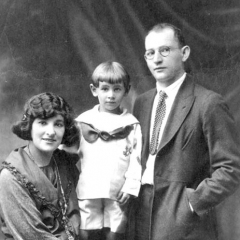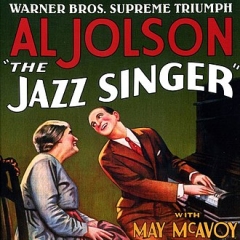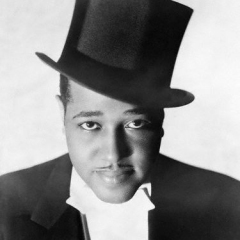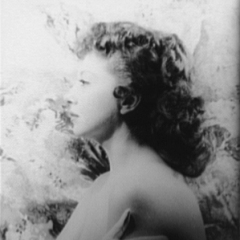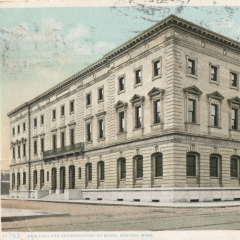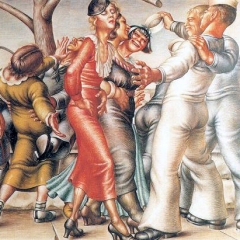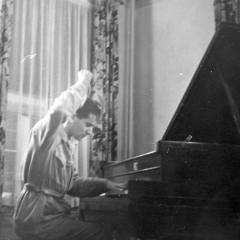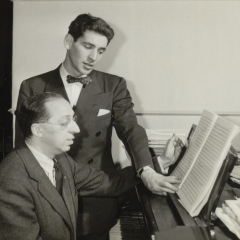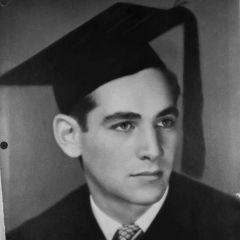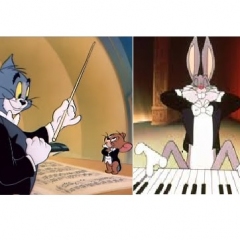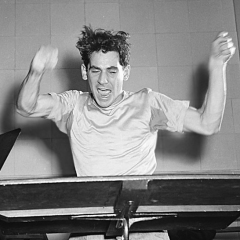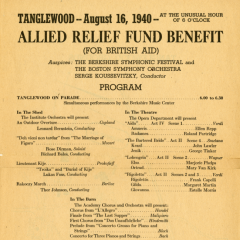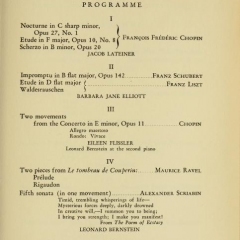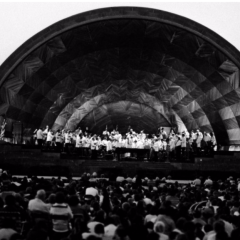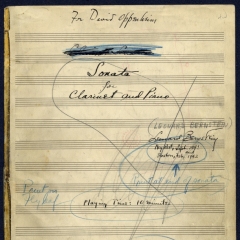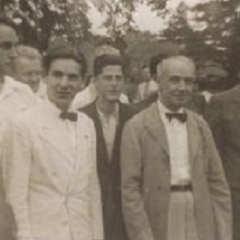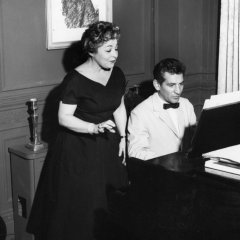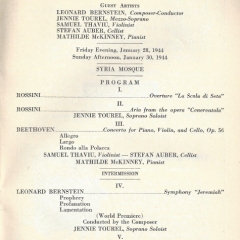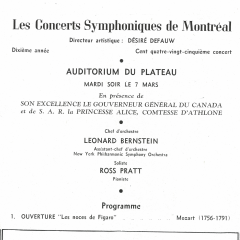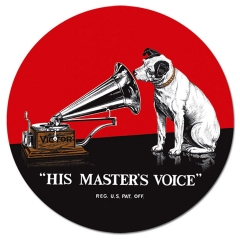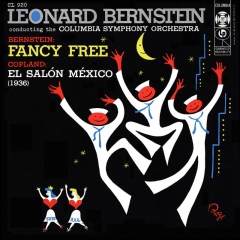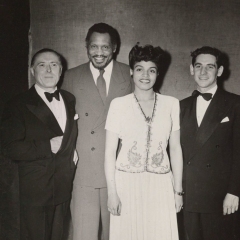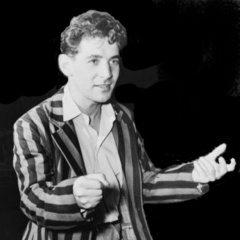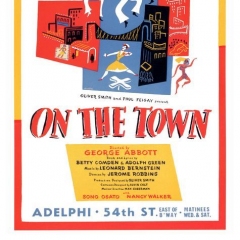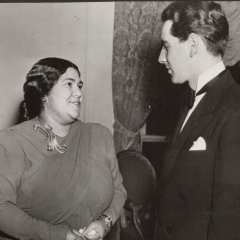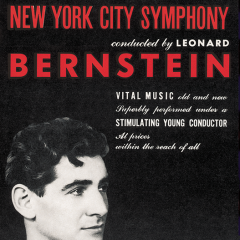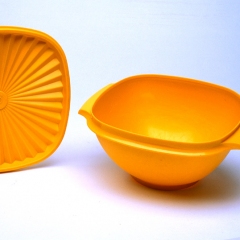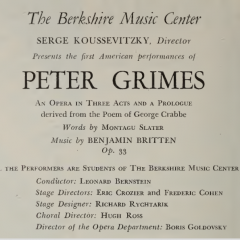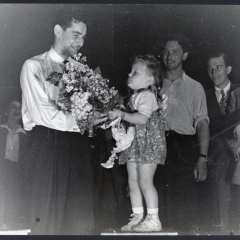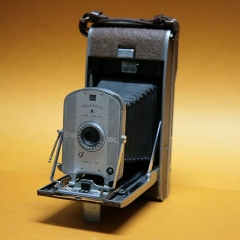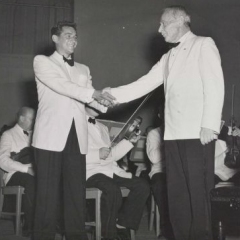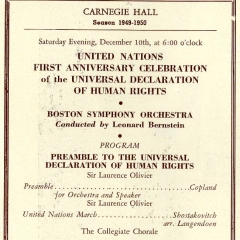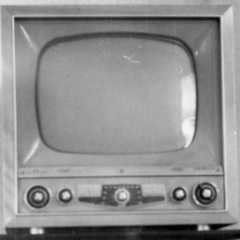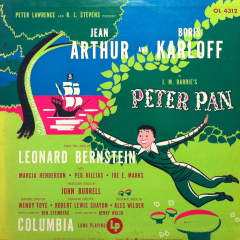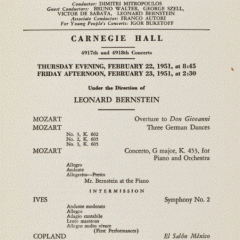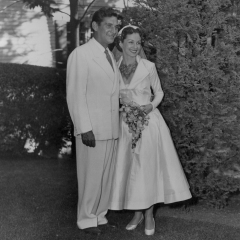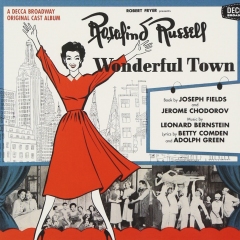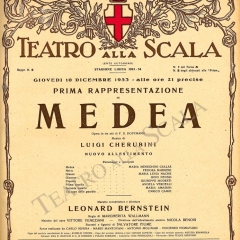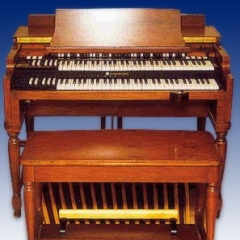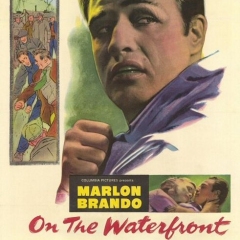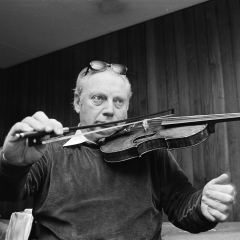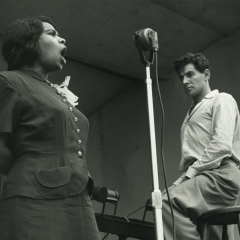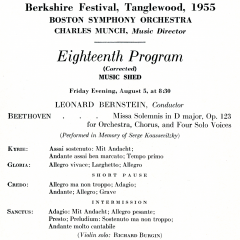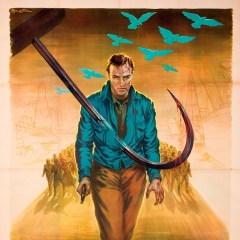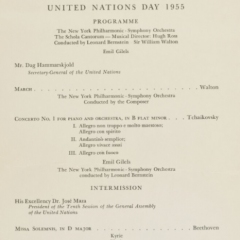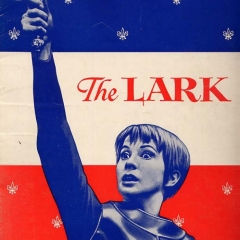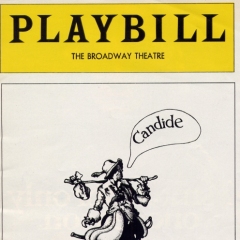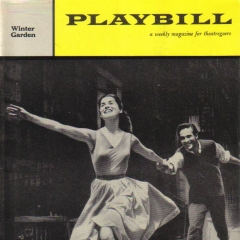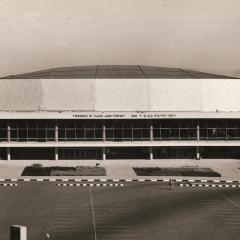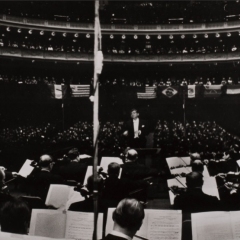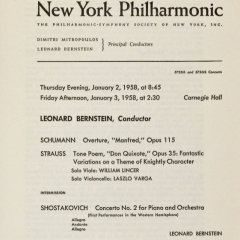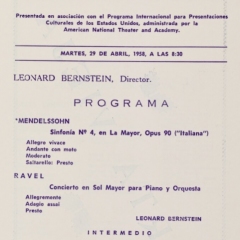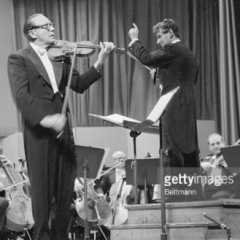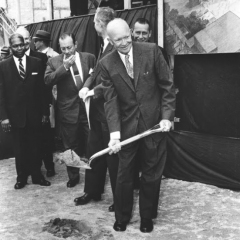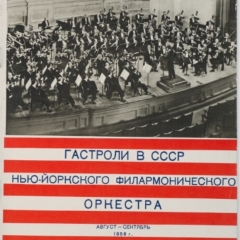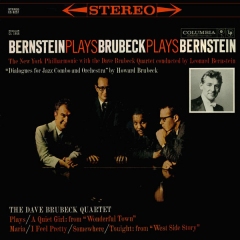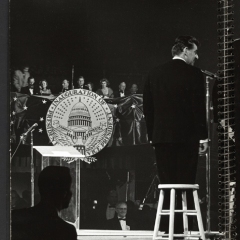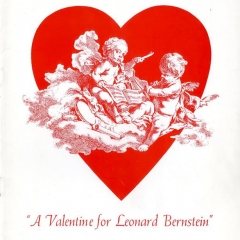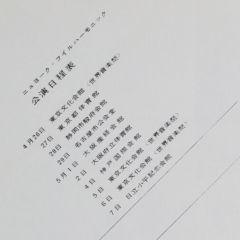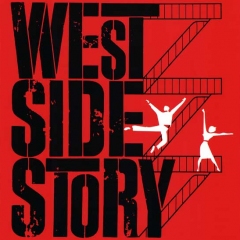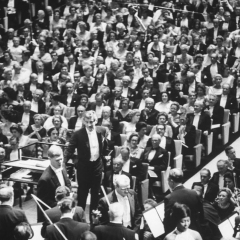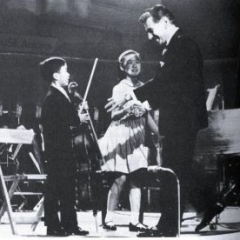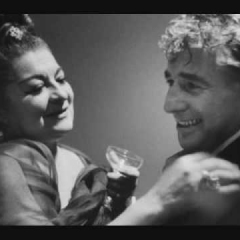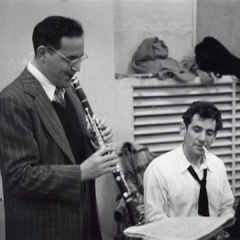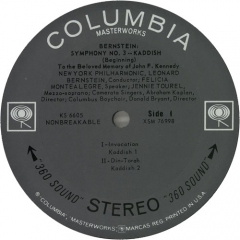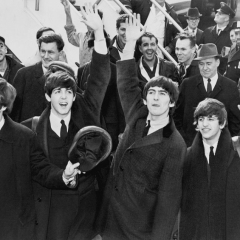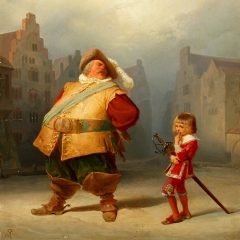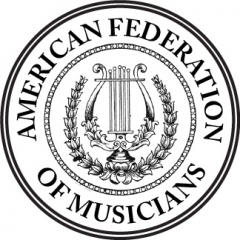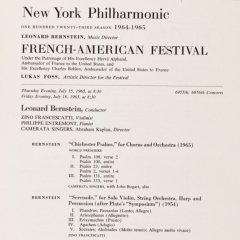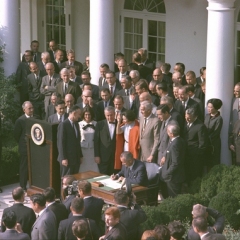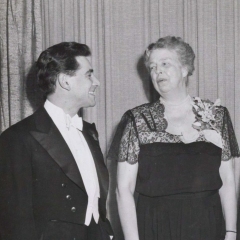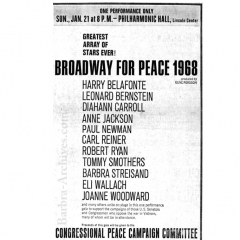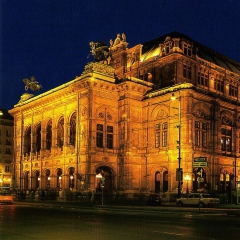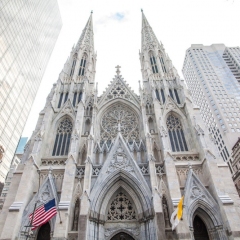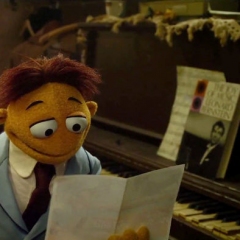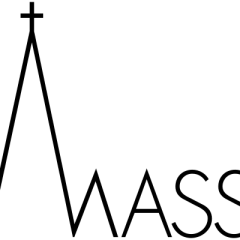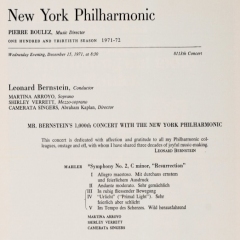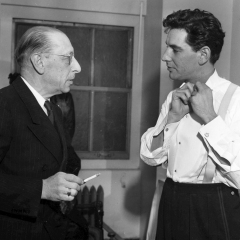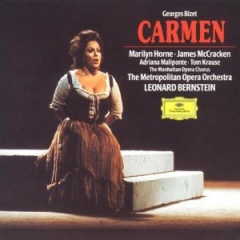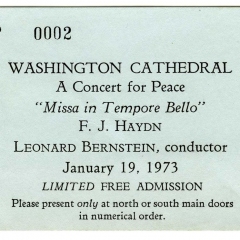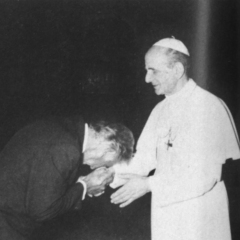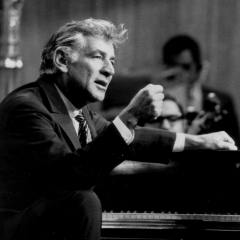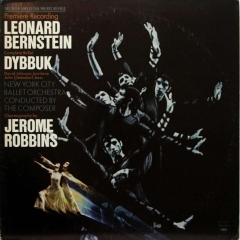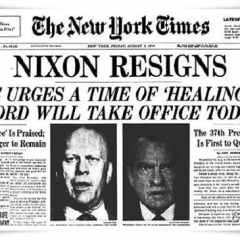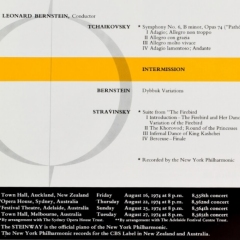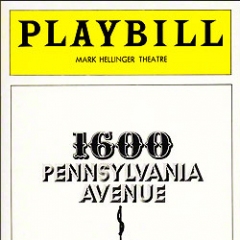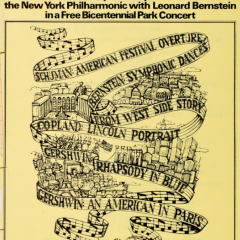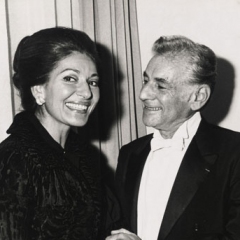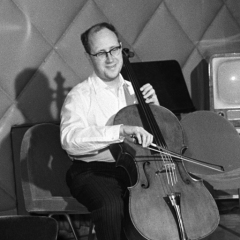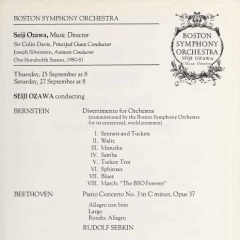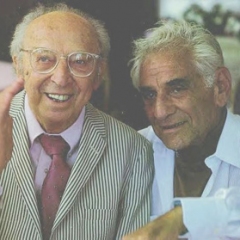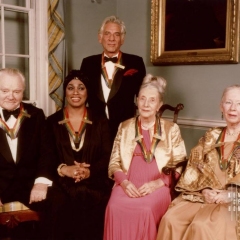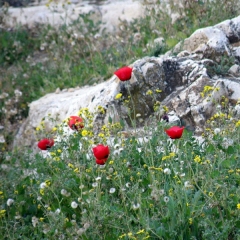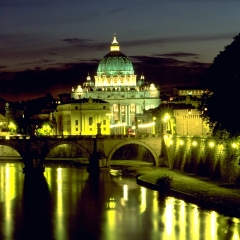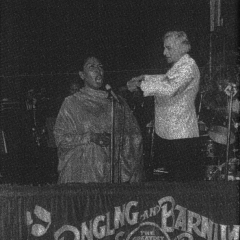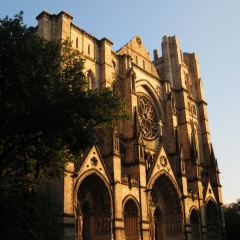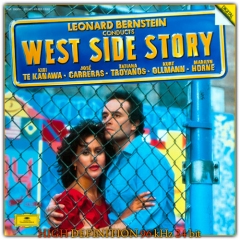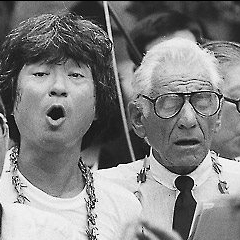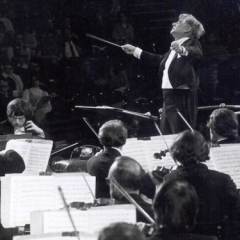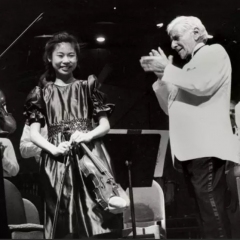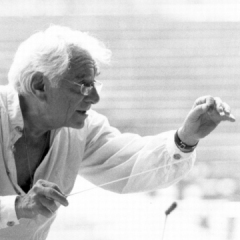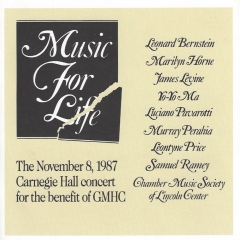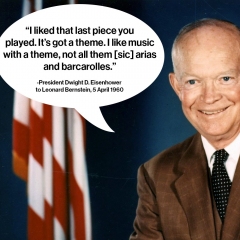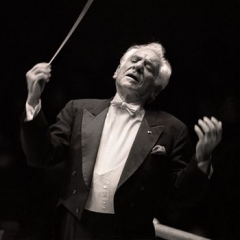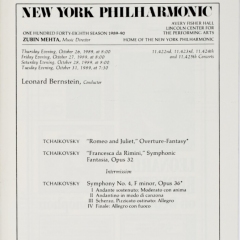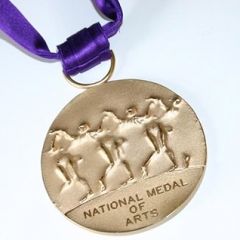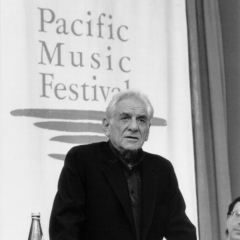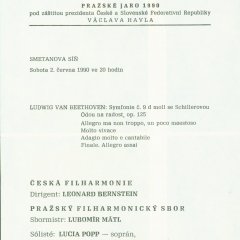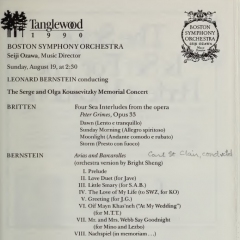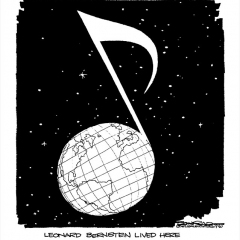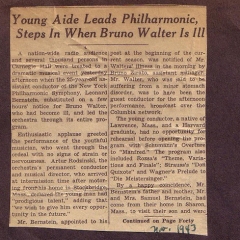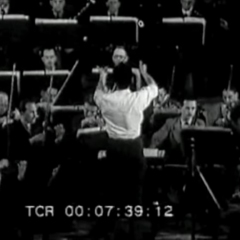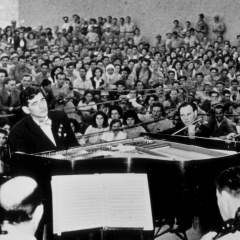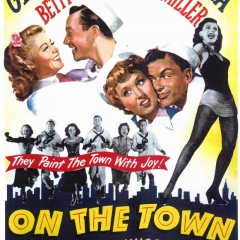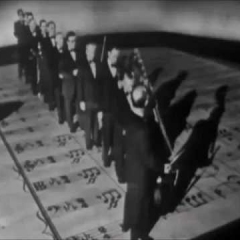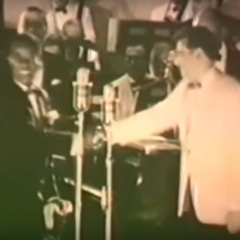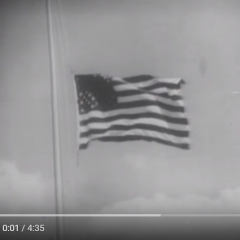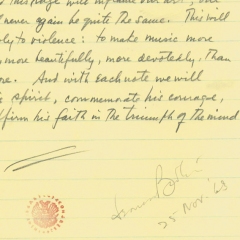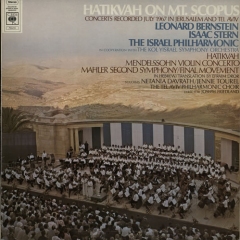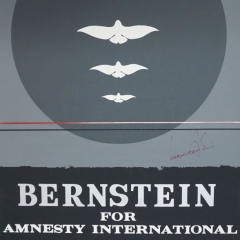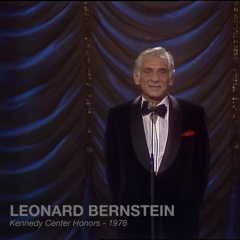-
August 25, 1918
Born to Jennie (nee Charna Resnick) & Samuel Joseph (Shmuel Yosef) Bernstein, Lawrence, Massachusetts.
-
August 18, 1920
The 19th Amendment to the U.S. Constitution is ratified prohibiting any U.S. citizen from being denied the right to vote based on sex.
-
February 12, 1924
"Rhapsody in Blue" premiered at a concert in New York City with composer George Gershwin on the piano with Paul Whiteman leading his Palais Royal Orchestra.
-
September 18, 1927
The Columbia Broadcasting System (CBS) went on the air. Founded under the name “Columbia Phonographic Broadcasting System”, the CBS radio network became one of the largest radio networks in the United States, and by 1941, launched a broadcast television network still in operation today.
-
October 6, 1927
Premiere of the movie "The Jazz Singer", the first motion picture with with sound, at Warner Bros.' flagship theater in New York City.
-
December 1927
CBS started broadcasting shows from the Cotton Club in New York City. Then house-bandleader Duke Ellington became the first black bandleader with this type of national platform.
-
November 18, 1928
Walt Disney's animated feature "Steamboat Willie", featuring Mickey Mouse, opened.
-
May 25, 1929
America’s opera icon, soprano Beverly Sills, was born. Sills performed under Leonard Bernstein’s baton as Carmen in 1956, and they enjoyed a warm friendship for over 30 years.
-
1930
The first line of frozen foods went public through the Birds Eye Frosted Food Company in 18 retail store around Springfield, Massachusetts. The original, flash-frozen foods included haddock fillets, 17 other cuts of meat and fish, as well as fruits and veggies like spinach, loganberries and raspberries.
-
1931
Began taking piano lessons with Susan Williams at the New England Conservatory of Music at age 13 and gave his first public performance at one of her pupils' concerts on 30 March 1932, performing "Cracovienne Fantastique" by Paderewski, "Tendre Aveu" by Schuett, and the Brahms G Minor Rhapsody.
-
October 1932
Began piano lessons with Helen G. Coates.
-
1934
First radio series: "Avol Presents Leonard Bernstein at the Piano", Station WBZ, Boston.
-
1934
Paul Cadmus, at the age of 29, painted The Fleet's In!, where the controversy of a group of sailors he pictured carousing among prostitutes and homosexuals inspired a public outcry. It later became the inspiration for Bernstein and Robbins' ballet, "Fancy Free" (1944).
-
May 14, 1934
Made first appearance as concerto pianist, performing the first movement of Grieg's Piano Concerto, with the Boston Public Schools Symphony Orchestra, under the baton of T. Francis Burk.
-
July 11, 1937
George Gershwin dies.
-
November 14, 1937
First met Aaron Copland at a New York dance recital--coincidentally on the day of Copland's 37th birthday. Bernstein “almost fell out of the balcony," he recalled. At the time that they met, Copland was already an established composer and one of the shining lights of American music. Several times during the first years of their friendship, Bernstein asked Copland if he could study composition with him. Though no formal lessons ever took place, Copland often offered constructive criticism for Bernstein's own music. For almost half a century, the intense, synergistic friendship that developed between them had a powerful impact on musical culture in the United States.
-
1938
The American Record Corporation is acquired by Columbia Broadcasting System and renamed Columbia Recording Corporation.
-
June 22, 1939
Graduated cum laude in Music from Harvard University. "I have always counted my years at Harvard among my greatest musical assets, for the general non-musical training given to me there opened my mind to the world's work in different fields, to the human thinking...." -Leonard Bernstein (Etude Magazine, April 1967)
-
September 1, 1939
The start of World War II, beginning with Hitler's invasion of Poland. Great Britain and France declared war on Germany two days later.
-
1940
Bugs Bunny and Tom and Jerry make their cartoon debuts. Both animated series were widely known for their incorporation of classical music to enhance the visual comedic plots.
-
July 7, 1940
Made his first appearance as a symphonic conductor at the newly opened Berkshire Music Center of the Tanglewood Music Festival. He conducted the Berkshire Music Center Orchestra in Randall Thompson’s Symphony No. 2, with composer himself in the audience.
-
August 16, 1940
Participates in the British War Relief Concert, a precursor to Tanglewood on Parade, with fellow Tanglewood student conductors including Lukas Foss, Thor Johnson, and Richard Bales.
-
April 30, 1941
Participated in a recital of the piano students of legendary Curtis faculty Isabelle Vengerova - Bernstein would later describe her as “great,” “demanding,” “tyrannical,” and “dear”.
-
May 29, 1941
Received his diploma in conducting from the Curtis Institute of Music.
-
July 11, 1941
Made his debut with the Boston Pops Orchestra after winning the Boston Herald Traveler Music Quiz. This was his first appearance with a professional orchestra. The prize was intended to be a scholarship to study at Tanglewood, but since Bernstein already had a scholarship to Tanglewood, they awarded him the opportunity to conduct the orchestra at the Esplanade Arts & Heritage Centre in Wagner's Prelude to "Die Meistersinger von Nürnberg".
-
December 7, 1941
The Japanese bombed the American fleet in Pearl Harbor, Hawaii, leading to the US involvement in World War II.
-
April 21, 1942
Premiere of
Sonata for Clarinet and Piano at the Institute of Modern Art in Boston, MA, with David Glazer, clarinet & Leonard Bernstein, piano.
-
July 1942
Worked as assistant to Serge Koussevitzky at
Tanglewood.
-
August 25, 1943
Premiere of
"I Hate Music", Jennie Tourel & Leonard Bernstein, Public Library, Lenox, MA.
The Tanglewood Festival and Tanglewood Music Center were suspended in 1943 due to the war. The Koussevitzky Music Foundation puts on concerts in the Lenox area, including a series of concerts at Sedgewick Hall in the Lenox Library.
-
November 14, 1943
-
January 28, 1944
Conducted premiere of his
Symphony No. 1: Jeremiah with the Pittsburgh Symphony Orchestra and mezzo-soprano Jennie Tourel.
-
March 7, 1944
Leonard Bernstein (then 25-years old) made his international conducting debut with Les Concerts Symphoniques de Montréal (now the Orchestre symphonique de Montréal) in a concert featuring Mozart's Overture to "The Marriage of Figaro," Beethoven’s Symphony No. 8, Sibelius’s Symphony No. 1, and Ravel's Piano Concerto in G Major with soloist Ross Platt.
-
April 1944
Signed his first contract with a recording company: RCA-Victor. Bernstein recorded his
Symphony No. 1: Jeremiah with the St. Louis Symphony Orchestra. RCA Victor Red Seal released Jeremiah in early December 1945 as three 78 rpm albums ($3.68) and promoted it extensively with full page ads in national publications, such as Life magazine.
-
April 18, 1944
Conducted premiere of his and Jerome Robbins' ballet "
Fancy Free" at the Metropolitan Opera House in New York City. Commissioned by American Ballet Theater, this was the first of Bernstein and Robbins' collaborations and became instantly popular.
-
May 14, 1944
Appeared in “An Evening with Paul Robeson, Leonard Bernstein and Muriel Smith, Carmen in Carmen Jones, with Samuel L. Barlow, presiding, at the Boston Opera House, Huntington Ave., Sunday, May 14, 1944 at 8:30pm, under the auspices of: The Joint Anti-Fascist Refugee Committee, the Council on African Affairs” -> from Special Agent Office Memorandum in FBI file BS 100-17761.
The Joint Anti-Fascist Refugee Committee (JAFRC) was set up in 1939 to aid people in flight from the Franco regime and was licensed by the federal government to help others escaping fascism. He was nominated to a fundraising position on Feb 13, 1945.
[Photo: Sam Barlow, Paul Robeson, Muriel Smith and Leonard Bernstein at benefit for Anti-fascist Refugee Committee, courtesy of the Library of Congress Music Division.]
-
August 26, 1944
First appearance at the Hollywood Bowl.
-
December 28, 1944
Broadway opening of "
On The Town" at Adelphi Theater in New York City.
-
January 14, 1945
Conducted the premiere of the Suite from "Fancy Free" with the Pittsburgh Symphony Orchestra.
-
January 21, 1945
Appeared at a Treasury Fund Benefit. Earlier that month (January 5), he supported the demand for justice for Recy Taylor, an African-American woman gang-raped by white men who were never indicted.
[Photo: Leonard Bernstein with Dorothy Maynor, who founded the Harlem School for the Arts in 1964.]
-
August 6, 1945
The United States drops nuclear weapons on Hiroshima.
-
October 8, 1945
Began three-year directorship of the New York City Symphony.
-
1946
Department stores begin selling Tupperware® in 1946.
-
May 15, 1946
Made his European debut with Czech Philharmonic at the very first Prague Spring festival in 1946.
-
August 6, 1946
Conducted the American premiere of Benjamin Britten's "Peter Grimes" at Tanglewood.
-
October 24, 1946
Conducted the premiere of his and Jerome Robbins' ballet “
Facsimile”, commissioned by American Ballet Theatre. The intense nature of the ballet led ABT to revise it, lightening its tone, and even adding some vague humor. The revised work was first performed in April 1947.
-
May 10, 1948
Conducted an orchestra of 17 Jewish musicians, survivors of the St. Ottilien internment camp, at Landsberg and Feldafing Displaced Persons camps in a program which included Gershwin's Rhapsody in Blue with Bernstein as soloist.
-
November 20, 1948
-
November 26, 1948
The Polaroid camera was first offered for sale.
-
April 8, 1949
Premiere of
Symphony No. 2: The Age of Anxiety by Serge Koussevitzky and the Boston Symphony Orchestra with Leonard Bernstein as piano soloist at Symphony Hall in Boston, MA.
-
December 9, 1949
Premiere of the MGM film “On The Town,” starring Frank Sinatra, Gene Kelly, Betty Garrett, and Ann Miller, at Radio City Music Hall. The film was Gene Kelly’s directorial debut and became an American movie classic.
-
December 10, 1949
First television appearance as conductor with the Boston Symphony Orchestra at UN Human Rights Day Concert at Carnegie Hall in New York City. Bernstein began the program, which also included an address by Eleanor Roosevelt, by conducting the premiere of Aaron Copland's “Preamble” with Sir Laurence Olivier narrating text from the Universal Declaration of Human Rights.
-
1950
United States household television sets reaches 10,000,000 units, up from 35,000 (1948).
-
February 9, 1950
Senator Joseph McCarthy delivers the Enemies Within speech, while holding a paper which purportedly listed 205 (later revised to 57) names of Communist Party members in the United States Department of State.
-
April 24, 1950
Broadway opening of
Peter Pan at the Imperial Theater in New York City.
-
October 2, 1950
The comic strip Peanuts, by Charles M. Schulz, was first published. Schroeder, distinguished by his precocious skill at playing the piano, as well as by his love of classical music and the composer Ludwig van Beethoven, made his last appearance in the Peanuts strip on September 12, 1999. This strip from September 1, 1966, has Coach Peppermint Patty comparing her catcher, Schroeder, to a certain great American Maestro!
-
February 22, 1951
Conducted the New York Philharmonic in the Premiere of Charles Ives' Symphony No. 2.
-
June 25, 1951
The first color television program is broadcast.
-
September 9, 1951
Marries Felicia Cohn Montealegre in Boston
-
June 12, 1952
Conducted the premiere of
Trouble in Tahiti at Brandeis University as part of the school's first Festival of the Creative Arts.
-
February 26, 1953
Broadway opening of
Wonderful Town at the Winter Garden Theatre in New York City. The original broadway production went on to win Best Musical, Best Performance by a Leading Actress in a Musical (Rosalind Russell), Best Choreography (Donald Saddler), Best Conductor and Musical Director (Lehman Engel) and Best Scenic Design (Raoul Pène Du Bois) at the 7th annual Tony Awards.
-
June 8, 1953
Memphis DJ Dewey Phillips introduced radio listeners to Elvis Presley, when he played "That's All Right" on his "Red, Hot, and Blue show". “Elvis is the greatest cultural force in the twentieth century. He introduced the beat to everything, music, language, clothes, it’s a whole new social revolution - the 60’s comes from it.” -Leonard Bernstein
-
November 5, 1953
Marilyn Monroe sings "Diamonds Are a Girl's Best Friend" in "How to Marry a Millionaire", the first feature film ever shot in 20th Century Fox's new widescreen process CinemaScope.
-
December 10, 1953
Became first American to conduct an opera at La Scala Opera House in Milan, Italy, in a production of Cherubini's Medea with soprano Maria Callas. In 1950, Bernstein made his debut with the La Scala Orchestras as conductor and piano soloist in a program included the overture to Mozart's "Don Giovanni", the piano concerto K450 and Mahler's Second Symphony.
-
1954
Hammond Organs introduces the B-3 and C-3 models, introducing the concept of "Harmonic Percussion", which was designed to emulate the percussive sounds of the harp, xylophone, and marimba. Despite several attempts by Hammond to replace them, these two models remained popular and stayed in continuous production through early 1975.
-
July 28, 1954
On the Waterfront premiered in New York City. Though Leonard Bernstein's score for the film did not win an Oscar, the film did win 8 Academy Awards, including Best Picture, Best Leading Actor (Marlon Brando), Best Supporting Actress (Eva Marie Saint), and Best Director (Elia Kazan).
-
September 12, 1954
Conducted the Orchestra Del Teatro La Fenice in the premiere of his
Serenade with Isaac Stern as violin soloist at Teatro La Fenice in Venice, Italy.
-
November 14, 1954
Wrote and performed his first
Omnibus telecast on the sketches of
Beethoven's Fifth Symphony.
-
January 7, 1955
Contralto Marian Anderson become the first person of color to perform at The Metropolitan Opera. She performed the role of Ulrica in Verdi's "Un Ballo in Maschera." Anderson's other notable performances include her 1939 recital on the steps of the Lincoln Memorial, made possible by First Lady Eleanor Roosevelt. Anderson, banned from many venues in the U.S., found early success in Europe, as did many other musicians of color during that era.
-
August 5, 1955
Conducted the Boston Symphony Orchestra in a performance of Beethoven’s "Missa Solemnis" at Tanglewood for the Koussevitsky Memorial Concert.
-
August 11, 1955
Conducted the premiere of
Symphonic Suite from "On the Waterfront" with the Boston Symphony Orchestra at Tanglewood. The suite was dedicated to his son Alexander, who had been born earlier that summer.
-
October 24, 1955
Conducted the New York Philharmonic’s first appearance at the
United Nations for United Nations Day.
-
November 17, 1955
Boardway Premiere of Jean Anouilh's 1952 play, The Lark, based on the trial and execution of Joan of Arc. An English adaptation was made by Lillian Hellman, and Bernstein composed incidental music for the accompaniment. The music now exists in an arrangement for mixed choir or a septet of solo voices as
The Lark (French and Latin choruses).
-
December 1, 1955
Rosa Parks refuses to vacate her seat aboard a Montgomery, AL, bus.
-
July 14, 1956
Conducted the Lewisohn Stadium Symphony Orchestra (made up of members of the New York Philharmonic) with Louis Armstrong and his All-Stars with Barrett Deems on drums, Edmond Hall on clarinet, Billy Kyle on piano, Arvell Shaw on bass, and Trummy Young on trombone. An all-jazz concert, the first half of the program featured The Dave Brubeck Quartet. From The New York Times, July 16, 1956: "An evening of jazz was tried at Lewisohn Stadium Saturday night for the first time in the thirty-one year history of the Stadium Concerts. With Louis Armstrong and his All-Stars and the Dave Brubeck Quartet as the attractions, the program drew a sellout crowd of 21,000."
-
December 1, 1956
Broadway opening of
Candide at the Martin Beck Theater in New York City.
-
September 26, 1957
Broadway opening of
West Side Story at the Winter Garden Theatre in New York City.
-
October 2, 1957
Conducted the Israel Philharmonic at the opening of Tel Aviv's Frederic R. Mann Auditorium (now, the Charles Bronfman Auditorium). Pianist Arthur Rubenstein performed Beethoven's "Emperor Concerto". Addressing the concert audience with a memorable gaff, The Prime Minister of Israel David Ben-Gurion thanked "Leonard Rubinstein and Arthur Bernstein."
-
October 4, 1957
The Soviet Union inaugurates the Space Age with the launch of Sputnik, the first artificial satellite.
-
November 19, 1957
Appointed Music Director of the New York Philharmonic for the 1958-59 season. Bernstein's appointment was historic, as he was the first American-born and trained music director of a major world orchestra.
-
January 2, 1958
Conducted his first concert as Joint Principal Conductor of the New York Philharmonic, a title he shared with Dimitri Mitropoulos during the 1957-58 season. At this concert, Bernstein conducted the New York Philharmonic in a program similar to that of his November 1943 New York Philharmonic debut: Schumann's "Manfred" Overture and Strauss' "DonQuixote." Additionally, Bernstein, conducting from the piano, led the New York Philharmonic in the U.S. premiere of Shostakovich's Piano Concerto No. 2.
-
January 18, 1958
Conducted his first Young People's Concert, just two weeks after becoming Music Director of the New York Philharmonic. Such programs were already a Philharmonic tradition when Bernstein arrived, but he made them a centerpiece of his work, part of what he described as his "educational mission." In this first program,
What Does Music Mean?, Bernstein used musical examples from Frédéric Chopin, Beethoven, Rossini, Johann Strauss II, Richard Strauss, and Ravel to teach young people that “the meaning of music is in the music, in its melodies, and in the rhythms, and the harmonies, and the way it's orchestrated.” Bernstein conducted a total of 53 such performances, all of which were telecast on CBS and syndicated in over 40 countries.
-
January 27, 1958
The United States and Soviet Union signed their first accord since the end of World War II - The Lacy-Zaroubin Agreement to exchange knowledge and persons in the cultural, technical and educational fields.
-
February 13, 1958
Van Cliburn wins the first International Tchaikovsky Competition.
-
April 29, 1958
Conducted the opening date of the New York Philharmonic’s first tour to South America.
-
April 8, 1959
Conducted the New York Philharmonic debut of Jack Benny in a Pension Fund Concert.
-
May 14, 1959
President Dwight D. Eisenhower broke ground for Lincoln Center at the site of David Geffen Hall, then named Philharmonic Hall.
-
August 22, 1959
Conducted the opening concert of the New York Philharmonic's first tour to the USSR at the Tchaikovsky Concervatory Hall in Moscow. Sponsored by the US State Department, the tour included 50 concerts in 17 countries— including three weeks in the Soviet Union. The tour culminated in a concert at the White House.
-
January 30, 1960
The David Brubeck Quartet, accompanied by Leonard Bernstein and the New York Philharmonic made a studio recording of Howard Brubeck's “Dialogues for Jazz Combo and Orchestra,” one month following its premiere at Carnegie Hall. Columbia Records released "Bernstein Plays Brubeck Plays Bernstein" with the “Dialogues” on Side A and the Dave Brubeck Quartet performing songs from West Side Story and Wonderful Town on Side B.
-
January 19, 1961
Conducted the pre-inaugural gala for President John F. Kennedy in a
Fanfare, which he composed for the occasion, as well at Stars and Stripes Forever and Handel's Hallelujah Chorus.
-
February 13, 1961
Lukas Foss conducted the New York Philharmonic in the world premiere of Leonard Bernstein's
Symphonic Dances from West Side Story, an orchestral suite of the dances from the show. The concert, "A Valentine for Leonard Bernstein," featured Bernstein compositions and celebrated the extension of his contract as the New York Philharmonic's Music Director.
-
April 26, 1961
Conducted opening date of the New York Philharmonic's first tour to Japan with Seiji Ozawa, assistant conductor.
-
July 1961
Amnesty International was founded in London.
-
October 18, 1961
West Side Story was released by United Artists (now part of MGM), and became the second highest grossing film in the United States that year. The film was nominated for 11 Academy Awards and won 10, including Best Picture (as well as a special award for Robbins), becoming the record holder for the most wins for a movie musical.
-
September 23, 1962
Conducted the inaugural concert of the New York Philharmonic in Philharmonic Hall (now David Geffen Hall) at Lincoln Center in New York City.
-
October 16, 1962
The United States and the Soviet Union begin a 13-day confrontation known as the Cuban Missile Crisis.
-
November 29, 1962
Was Master of Ceremonies at a fundraising gala for the National Cultural Center at the DC Armory, hosted by President and Mrs. Kennedy. The gala helped finance what was to become the Kennedy Center for the Performing Arts. Among the notable performers, was a seven-year-old Yo-Yo Ma, accompanied by his 11-year-old sister and accompanist, Yeou-Cheng.
-
March 13, 1963
Premiere of “When my Soul Touches Yours” by mezzo-soprano Jennie Tourel at Townhall in New York City. This is the second of
Two Love Songs composed by Bernstein in 1949, both of which were dedicate to Ms. Tourel, his good friend. Ms. Tourel premiered the first song, "Extinguish My Eyes" at Town Hall in 1949.
-
April 10, 1963
Premiered Francis Poulenc's Sonata for Clarinet and Piano with Benny Goodman at Carnegie Hall. Poulenc himself planned to perform the piano part at the premiere. Sadly, the composer died of a heart attack four months before the concert. Bernstein accompanied Goodman, who had commissioned the work, in Poulenc’s place.
-
November 22, 1963
President John F. Kennedy is assassinated.
-
November 24, 1963
Conducted Mahler's Symphony No. 2, "Resurrection", in a televised tribute to President Kennedy.
-
November 25, 1963
-
December 10, 1963
Led premiere of
Symphony No. 3: Kaddish with the Israel Philharmonic Orchestra in Tel Aviv, Israel with Hannah Rovina as narrator and Jennie Tourel as mezzo-soprano soloist.
-
February 7, 1964
Beatlemania arrives in the United States. 3,000 Screaming fans greet John, Paul, George, and Ringo at JFK Airport in New York City. Two days later, the Beatles made their U.S. debut on The Ed Sullivan Show.
-
March 6, 1964
U.S. operatic conducting debut at the Metropolitan Opera House in New York City, conducting first of ten performances of Verdi's "Falstaff", Franco Zeffirelli, director.
-
May 1964
The Associated Musicians of Greater New York, Local 802 American Federation of Musicians, representing the musicians of the New York Philharmonic, negotiated the first 52 week contract (with 4 weeks paid vacation) for any orchestra in the United States. The full-time employment began in September of that year.
-
March 24, 1965
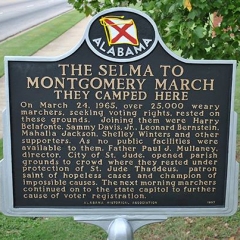
The Stars for Freedom Rally was held on the final night of the historic Selma to Montgomery March in support of voting rights led by Dr. Martin Luther King, Jr.
At the request of Dr. King, Harry Belafonte organized a group of the country’s best known entertainers to put on a spectacular show for the marchers. The “stars” included Sammy Davis Jr., Peter, Paul and Mary, Tony Bennett, Pete Seeger, Joan Baez, Mahalia Jackson, Sidney Portier, Nipsy Russell, Mike Nichols, Elaine May, Alan King, Tony Perkins, Shelly Winters, Odetta, Nina Simone, and Leonard Bernstein. Mr. Belafonte paid most expenses of the event.
The group entertained an estimated 25,000 marchers at the City of St. Jude, a Roman Catholic complex outside of Montgomery, which offered its 36-acre campus to the weary marchers who slept on the athletic field. A rally was held to inspire the marchers and prepare them for the next day’s journey to the Alabama State Capitol.
Dr. King was cheered when he appeared on stage and said “This is the greatest march on any capitol that there has ever been in the South. This will go down in history as one of the greatest developments in the civil rights movement.” The next day, King delivered one of his most famous speeches, “How Long, Not Long”.
-
July 15, 1965
Conducted the New York Philharmonic in the world premiere of
Chichester Psalms at Philharmonic Hall. Commissioned by Rev. Walter Hussey, Dean of the Cathedral of Chichester in Sussex, England, Bernstein composed the work for the Cathedral's August 1965 festival.
-
September 29, 1965
The National Endowment for the arts was created by the Congress of the United States and President Lyndon B. Johnson.The NEA was established to nurture American creativity, to elevate the nation’s culture, and to sustain and preserve the country’s many artistic traditions.
-
March 14, 1966
Made debut at the Wiener Staatsoper, conducting Giuseppe Verdi's “Falstaff” in a production directed by Luchino Visconti.
-
November 20, 1966
Awarded the Eleanor Roosevelt Humanities Award at a dinner sponsored by the Trustees of the Washington Chapter of the Guardians of Israel at the Sheraton Park Hotel in Washington, DC. The award was presented to Bernstein by the Honorary James Roosevelt. In his address, Bernstein said "I have always revered the name Eleanor Roosevelt, and always shall; and to have my name linked with hers on this medallion is a transcendental experience." [Photo: Leonard Bernstein and Eleanor Roosevelt backstage at the beenfit concert for the United Jewish Appeal in December 1948]
-
July 9, 1967
-
January 21, 1968
With Paul Newman, Bernstein co-hosted "Broadway for Peace," a fundraiser at Lincoln Center's Philharmonic Hall to support the Congressional Peace Campaign Committee, which funded campaigns of congressional candidates opposing the Vietnam War. Harry Belafonte opened the star-studded program featuring Joanne Woodward, Carl Reiner, Tommy Smothers, Diahann Carroll, Eli Wallach, Anne Jackson, and Barbra Streisand.
-
April 4, 1968
Martin Luther King, Jr. was assassinated in Memphis, TN.
-
April 13, 1968
Conducted a production of Richard Strauss's "Der Rosenkavalier" with Otto Schenk, director, at the Vienna State Opera.
-
June 8, 1968
Conducted members of the New York Philharmonic in the Adagietto from Mahler's Symphony No. 5 at the funeral of Robert Kennedy at St. Patrick's Cathedral in New York City.
-
August 25, 1968
Named Laureate Conductor for Life by the New York Philharmonic.
-
July 20, 1969
Neil Armstrong becomes the first human to walk on the moon's surface.
-
August 1969
The Woodstock Music and Art Fair draws more than 450,000 people to Bethel, NY.
-
November 10, 1969
Sesame Street premiered on PBS.
-
April 6, 1971
Igor Stravinsky died in New York, NY, at the age of 88.
-
September 8, 1971
Inaugurated the John F. Kennedy Center for the Performing Arts in Washington, D.C., with premiere of
MASS: A Theater Piece for Singer, Players, and Dancers.
-
December 15, 1971
Conducts his 1,000th concert with the New York Philharmonic, performing Mahler's Symphony No.2 "Resurrection".
-
April 8, 1972
Conducted the London Symphony Orchestra in a memorial concert for Igor Stravinsky at Royal Albert Hall in London. On the program were three works including "The Rite of Spring", "Capriccio for piano and orchestra" (Michel Béroff, piano), and "Symphony of Psalms" (The English Bach Festival Chorus).
-
September 19, 1972
Conducted opening night of the Metropolitan Opera's 1972-1973 season, a new production of Bizet's "Carmen", with Marilyn Horne singing the title role. This was the first time LB and Ms. Horne worked together. The Deutsche Grammophon studio recording of that performance went on to win the Grammy Award for Best Opera Recording in 1974. Bernstein and Horne won two Grammy Awards (each) in their projects together, the second being the 1986 Grammy Award for Best Cast Show Album, the studio recording of "West Side Story," conducted by Bernstein.
-
January 19, 1973
Conducted a Concert for Peace at National Cathedral in Washington D.C., with members of National Symphony Ochestra, in protest against President Richard Nixon, on the eve of his second term in office.
-
June 23, 1973
Conducted his "Chichester Psalms" and Bach's "Magnificat" for Pope Paul VI in celebration of the tenth anniversary of his elevation to the Papacy. Bernstein conducted the Orchestra Sinfonica de Roma (RAI), the Harvard Glee Club and the Newark Boys Chorus. The Pope blessed the musicians and thanked Bernstein, “Ecco un Americano che vien a dare lezione musicale a noi della vecchia Europa”. (Behold an American who has come to give music lessons to us of the old Europe.) To our knowledge, "Chichester Psalms" is the first musical work with a Hebrew text to be performed at the Vatican.
-
October 6, 1973
The coalition of Arab states fight against Israel until October 25.
-
October 9, 1973
Gave the first in a series of lectures collectively titled
The Unanswered Question while serving as the Charles Eliot Norton Professor of Poetry at Harvard University, his alma mater. Bernstein explained the importance of "inter-disciplinary values — that the best way to 'know' a thing is in the context of another discipline." He communicated his ideas of the universality of musical language through wide-ranging analogies to linguistics, aesthetic philosophy, acoustics as well as music history.
-
May 16, 1974
Conducted the premiere of his and Jerome Robbins' ballet
Dybbuk with the New York City Ballet at the State Theater in New York City.
-
August 9, 1974
Richard Nixon resigns from the office of the President, following the escalation of the Watergate scandal. After his resignation, he was issued a pardon by his successor, Gerald Ford.
-
August 16, 1974
Premiered "Dybbuk Variations" on the opening date of the New York Philharmonic's tour to New Zealand and Australia. The music originated from the “Dybbuk” ballet, a collaboration with choreographer Jerome Robbins.
-
1976
Conducted the Bavarian Radio Symphony Orchestra with the great pianist Claudio Arrau at a benefit concert for Amnesty International.
-
May 4, 1976
Broadway opening of
1600 Pennsylvania Avenue at the Mark Hellinger Theater in New York City.
-
July 4, 1976
The United States of America celebrates its Bicentennial.
-
July 4, 1976
Conducted the New York Philharmonic in Central Park, celebrating the American Bicentennial. This was the closing concert of the 1976 Bicentennial Tour, which featured over performances in the 9 States and 5 European countries.
-
September 16, 1977
The great soprano Maria Callas died in Paris, France. Callas was commonly referred to as “La Divina,” and Leonard Bernstein, amazed by the range of her accomplishments, called her “the Bible of Opera.”
-
October 11, 1977
Premiere of
Songfest,
Three Meditations from MASS and
SLAVA! A Political Overture for Orchestra at the Kennedy Center in Washington, DC, by the National Symphony Orchestra for Mstislav Rostropovich's inaugural concerts as music director.
-
December 5, 1978
Hosted the first annual Kennedy Honors at the John F. Kennedy Center for the Performing Arts. The honorees were Marian Anderson, Fred Astaire, George Balanchine, Richard Rodgers and Arthur Rubinstein. Bernstein would go on to receive the honor himself in 1980.
-
February 15, 1979
Conducted the Orquesta Filarmónica de la Ciudad de Mexico in Mexico City in a concert for state visit by President Jimmy Carter to President López Portillo.
-
January 17, 1980
New York City Ballet premiered 'Suite of Dances' (from 'Dybbuk Variations'). The original ballet, Dybbuk, was created in 1974, a collaboration between Leonard Bernstein and choreographer Jerome Robbins.
-
April 12, 1980
The United States Olympic Committee voted to boycott the Summer Olympics in Moscow in response to the Soviet invasion of Afghanistan.
-
September 25, 1980
Premiere of
Divertimento with the Boston Symphony Orchestra and Seiji Ozawa, conductor.
-
November 14, 1980
Conducted Copland's Lincoln Portrait, with Copland as narrator, on Copland's 80th birthday with the National Symphony Orchestra.
-
December 7, 1980
Received Kennedy Center Honor for Lifetime Contributions to American Culture through the Performing Arts, Washington, D.C.
-
May 27, 1981
Conducted the premiere of
Halil: Nocturne with flautist Jean Pierre Rampal and the Israel Philharmonic Orchestra in Tel Aviv, Israel.
-
June 12, 1981
Conducted "Kaddish", "Halil", and "Three Meditations" from "Mass" with the Santa Cecilia Orchestra honoring Pope John Paul II at the Vatican.
-
August 17, 1982
The first commercial compact disc was produced. It was a recording from 1979 of Claudio Arrau performing Chopin waltzes (Philips 400 025-2). Arrau was invited to the Langenhagen plant to press the start button.
-
October 1, 1982
The first popular music compact discs were released.
-
April 30, 1983
Conducted mezzo-soprano Shirley Verrett and the Ringling Bros. and Barnum & Bailey Circus Orchestra in the "Star Spangled Banner" at Madison Square Garden. The occasion was a major Gay Men’s Health Crisis AIDS fundraising event that marked a turning point in the fight for public awareness of AIDS and advocacy for medical care and research.
-
December 31, 1983
Founded and conducted the first New Year's Eve Concert for Peace at the Cathedral of St. John the Devine in New York, NY, and opened the program conducting the New York Philharmonic in Aaron Copland's “Fanfare for the Common Man.”
In 1985, Bernstein premiered the Postlude to his opera "A Quiet Place" at the Concert for Peace.
The 1990 NYE Concert was a tribute to Bernstein, who had passed away two months earlier on October 14. It was the first public concert to memorialize Bernstein and among the artists and dignitaries present were Lukas Foss, Marin Alsop, and Kathleen Battle.
-
March 29, 1984
Named Honorary Member of the New York Philharmonic.
-
September 4, 1984
Recorded West Side Story for Deutsche Grammaphon with opera singers, including Kiri Te Kanawa, Jose Carreras and Tatiana Troyanos in New York City.
-
January 27, 1985
Gave
Hope in the Nuclear Age speech to the congregation of All Souls Unitarian Church in New York, NY.
“If we can pray, let us pray. I know of only two ways to pray. One is to say thank you and sing a song. The other is to pray that our boastfully called divine spark, our pilot light, our little blue flame that is our capacity to love, that little light may never be extinguished as long as we inhabit this wonderful earth with one another."
-
August 6, 1985
Conducted the European Community Youth Orchestra at the Hiroshima Peace Ceremony to commemorate the 40th anniversary of the bombing.
-
May 6, 1986
Conducted the London Symphony Orchestra in a concert of his works at the Barbican Center, as part of a two-week Bernstein Festival. Queen Elizabeth II was in attendance at this concert.
-
July 26, 1986
Conducted a now-legendary performance of his "Serenade" with the Boston Symphony Orchestra and Midori at Tanglewood. During the performance, the 14-year-old Midori broke her E string, so she quickly exchanged her 3/4 size violin with the concertmaster's full size violin. Moments later, she broke the E string again, again trading her instrument without missing a note.
-
1987
Founded the Orchestra Academy of the
Schleswig-Holstein Musik Festival at Salzau, Germany, recreating the mentorship atmosphere of his early years at the Tanglewood Music Festival and passing down over 40 years of knowledge and experience to a new generation of musicians.
-
November 8, 1987
Leonard Bernstein and James Levine conducted the legendary "Music for Life" AIDS research benefit concert at Carnegie Hall. This event raised a staggering $1.7 million and included such performers as Leontyne Price, Marilyn Horne, Luciano Pavarotti, Samuel Ramey, and Yo-Yo Ma. The spirit of “Music for Life” was exemplified by the voluntary participation of members from New York’s leading orchestras.
-
May 9, 1988
Conducted premiere of
Arias and Barcarolles at the Equitable Center Auditorium in New York City.
-
September 1988
Conducted the Vienna Philharmonic on tour in Jerusalem and Tel Aviv.
-
September 1, 1989
Conducted the Polish National Radio Sympony Orchestra, Warsaw and Poznan Choruses, and international soloists in a Warsaw concert commemorating the 50th anniversary of the outbreak of World War II, sharing the podium with Lukas Foss and Krzysztof Penderecki.
-
October 31, 1989
Conducted last concert with the New York Philharmonic.
-
November 9, 1989
Fall of the Berlin Wall.
-
November 15, 1989
Refused National Medal of Arts from President George H.W. Bush as a protest against revoked NEA grant in connection with a New York City exhibit of AIDS-related art.
-
December 25, 1989
Conducted Beethoven Symphony No. 9 with the Bavarian Radio Symphony Orchestra and members of the New York Philharmonic, London Symphony Orchestra, Orchestre de Paris and Leningrad Philharmonic.
Berlin Freedom Concert celebrating opening of Berlin Wall, Schauspielhaus, East Berlin. Telecast worldwide.
-
1990
Co-founded the
Pacific Music Festival with the London Symphony Orchestra. The PMF is an international music festival held annually in Sapporo, Japan, modeled on the Tanglewood Music Festival.
-
June 3, 1990
Conducted the Czech Philharmonic in his last European concert. Returning to the Prague Spring Festival, where he made his European debut in 1946, he lead two performances of Beethovenʼs Ninth Symphony with soprano Lucia Popp, alto Ute Trekel-Burckhardt, tenor Wieslav Ochman and bass Sergej Kopčák.
-
August 19, 1990
Conducted the Boston Symphony Orchestra at Tanglewood, in what would be his final concert. Carl St. Clair conducted the BSO first in Bright Sheng's orchestral transcription of Bernstein's "Arias and Barcarolles", and Bernstein then conducted Britten's "Four Sea Interludes" and Beethoven's Symphony No. 7.
-
October 14, 1990
The death of Leonard Bernstein, 6:15 p.m. at his home, 1 West 72nd Street, NYC. Cardiac arrest brought on by side-effects of treatment for mesothelioma.
